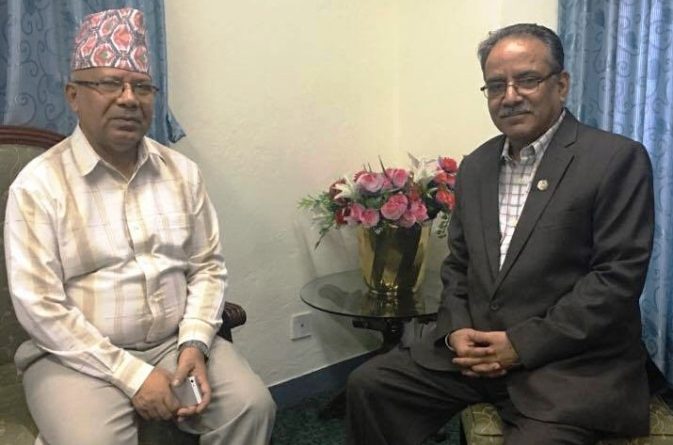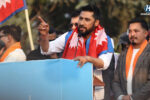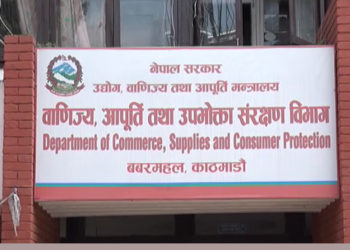KATHMANDU: Chairman of Maoist Center Pushpa Kamal Dahal “Prachanda”, who was ousted from power recently following the collapse of his alliance with the Nepali Congress, is now making renewed efforts to consolidate his political influence.
Prachanda, who exited power amid the split of the Janata Samajwadi Party under Upendra Yadav and the weakening of the Samajwadi Morcha, is again pushing for party unity.
On March 4, 2024, Prachanda severed his alliance with the United Socialists and joined forces with the CPN-UML.
At that time, Unified Samajwadi Chairman Madhav Kumar Nepal accused Prachanda of betrayal and vowed to move forward independently.
Now, Prachanda is extending an olive branch to Nepal by proposing to make him both the leader of the parliamentary party and the prime minister as part of a unity agreement.
Sources close to Madhav Nepal reveal that Prachanda has broached the subject of party unity with Nepal on four separate occasions since his departure from power.
Prachanda visited Nepal’s residence in Koteshwar on Monday and met him again in Khumaltar on Thursday.
For Prachanda, who has faced significant opposition from within his own party, including Deputy General Secretary Janardhan Sharma, the immediate crisis was somewhat mitigated by the conclusion of a Standing Committee meeting on Thursday.
Prachanda indicated his readiness to address the ideological and political concerns raised by Sharma in a forthcoming document.
Prachanda, dealing with internal party challenges and the stress of navigating the Standing Committee, is preparing for a central committee meeting in the third week of September.
This will follow a series of meetings across all provinces.
Prachanda aims to fortify his position and counteract the pressure he faces by strengthening both his party’s presence and its local achievements.
Additionally, Prachanda has proposed unity with the Madhav Kumar Nepal-led Unified Socialist to alleviate the current political pressures.
This move includes a potential leadership role for Nepal within the merged entity, a strategy Prachanda has discussed with Nepal during their recent meetings.
Some leaders interpret Prachanda’s push for unity as a reaction to the possibility of Nepali Congress and UML contesting the 2084 elections independently.
Prachanda’s proposal envisions a scenario where a united front of Maoist Center and Unified Socialist forces could potentially draw the Nepali Congress, which is allied with the CPN-UML, back into their fold, thus positioning Nepal as prime minister.
This strategy may also be an attempt to capitalize on anticipated tensions between the CPN-UML and Nepali Congress.
In a party meeting, Prachanda highlighted the necessity of leftist unity to avoid difficulties in the 2084 BS elections.
Maoist Vice Chairman Agni Prasad Sapkota told journalists that there is a strong public desire for a reorganization of the Communist Party, a sentiment echoed by the results of previous elections.
Both Prachanda and Nepal are under pressure as the 2084 elections approach.
To secure their current positions and future prospects, they are exploring various strategic alliances, including possible unity with the CPN led by Netra Bikram Chand ‘Biplav’ and Dr. Mahindra Rai Yadav, who separated from Dr. Baburam Bhattarai.
Observers noted that Prachanda’s current efforts to re-align with Madhav Kumar Nepal and propose his leadership roles reflect his strategic maneuvering to navigate the complex political landscape and enhance his party’s position ahead of the forthcoming elections.
“Based on discussions with Prachanda comrade, it’s evident that Prachanda feels threatened by the Maoists,” a leader close to Madhav Nepal told Khabarhub.
“The upcoming 2084 elections also seem to be impacting him. While we are not currently in favor of unity, Prachanda desperately needs it. This is the crux of what he conveyed in Koteshwar and Khumaltar. However, given that he has yet to reconcile even with former Maoists, achieving unity with us seems unlikely at this point.”
Unity as a Defensive Strategy
Jaganath Khatiwada, Deputy General Secretary of the United Socialist Party, stated that unity cannot be achieved merely because Prachanda desires it.
He noted that Prachanda’s recent push for unity is a reaction to various pressures and challenges.
“There is a proposal for unity from Prachanda and the Maoists,” Khatiwada said, “but it is not feasible at the moment.”
He compared Prachanda’s efforts to “shaking small trees and plucking mangoes,” suggesting that these proposals have little impact. “The major issues remain unresolved. Shaking us won’t solve the problem.”
Despite Prachanda’s proposal to make Madhav Nepal the leader of the parliamentary party and the prime minister post-unity, those close to Nepal suggest that significant ideological alignment must first be achieved.
Khatiwada also highlighted that unity is not possible given that the party’s 10th convention has just concluded and the Central Committee has not yet been elected.
“Our Central Committee has not been formed, and its members have not yet been sworn in,” he said.
“We cannot keep shifting for Prachanda’s convenience. If someone who has recently betrayed us seeks unity, we are open to welcoming Madhav as an activist, but not under the current circumstances.”
Ongoing Discussions and Internal Challenges
Another Unified Socialist leader revealed that discussions about unity are ongoing but have mostly been driven by Prachanda’s insistence.
The leader noted that these talks have occurred four times recently, but have yet to yield substantial progress.
Potential Changes and Strategic Shifts
Some leaders interpret Prachanda’s push for unity as a reaction to the possibility of Nepali Congress and UML contesting the 2084 elections independently.
If the Nepali Congress and CPN-UML succeed in the elections, Prachanda may face increased pressure to consolidate power.
According to another Unified Socialist leader, Prachanda has proposed changing the party’s name and election symbol as part of the unity agreement.
“Prachanda is open to renaming the party and altering its symbol,” the leader said.
“Prachanda is also prepared to transition from the Maoist identity to a more socialist alignment.”
In response, Unified Socialist Chairman Madhav Nepal has emphasized the need for uniformity in ideological views before considering any unity agreement.
Despite Prachanda’s proposal to make Madhav Nepal the leader of the parliamentary party and the prime minister post-unity, those close to Nepal suggest that significant ideological alignment must first be achieved.









Comment